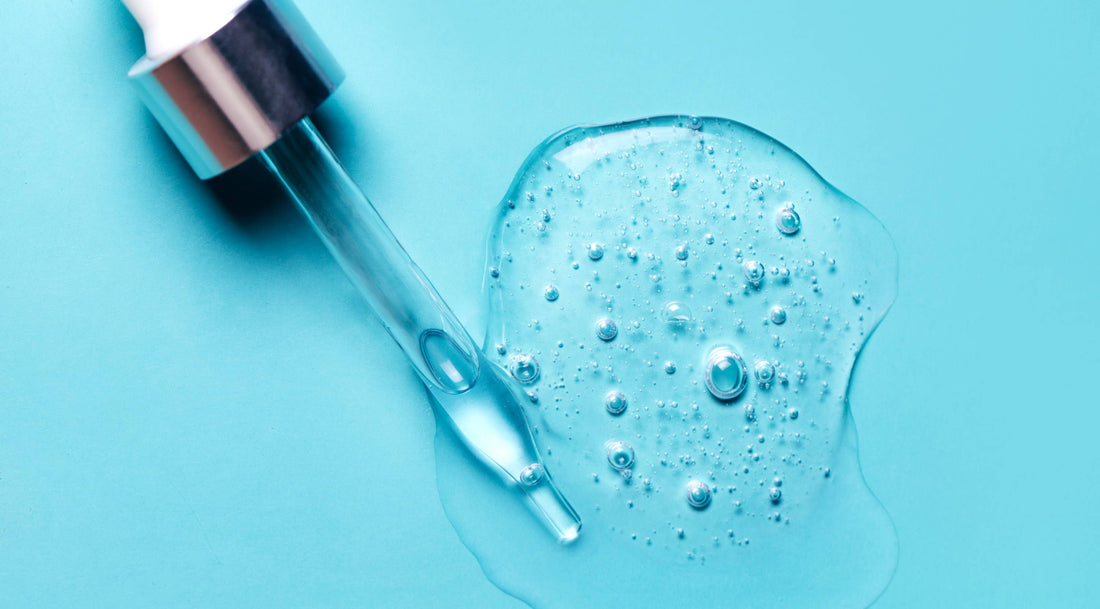Rosacea is a relatively common skin condition with, regrettably, no cure. Characterized by redness primarily across the cheeks, this auto-inflammatory condition can be pesky and will flare up under certain conditions. Although there is currently no cure, there are ways to help suppress the redness that takes over the skin. And, while most acids are off-limits for people with this skin condition, one “acid” is safe and helpful for making the skin feel and look better - hyaluronic acid. Here’s why hyaluronic acid is safe (and even recommended) for people with rosacea.
What Is Hyaluronic Acid?
Hyaluronic acid is naturally produced in most animal tissues. In humans, nearly half of it resides in our skin cells. The primary purpose of hyaluronic acid is to keep water in our bodies. As we are mostly made of water, we must keep our tissues as moist as possible.
Yet, as we age, we have less hyaluronic acid, causing our tissues to become more dehydrated, easily irritated, and revealing visible signs of aging in our skin (hello, wrinkles and lines).
When used in a topical serum, hyaluronic acid can be incredibly moisturizing for the skin. Hydrating your skin with something the body already naturally produces is usually safe and effective for most people - including those with sensitive skin and yes, even skin conditions like rosacea.
What Is Rosacea?
Rosacea is most likely an autoimmune condition that causes facial flushing. It is “most likely” considered an autoimmune condition of the skin because it appears that inflammation targets sebaceous (or oil-producing) cells of the skin. Intriguingly, people with rosacea tend to have other autoimmune disorders like rheumatoid arthritis as well, which is also a characteristic of autoimmune diseases. However, there are still plenty of unanswered questions about this skin condition, including its root causes.
The redness that characterizes this condition can spread all over the face, but commonly appears on the cheeks. It can also worsen over time. And, like most autoimmune conditions, you can also have flare-ups, where the redness worsens, and you can even develop papules. Flare-ups may be caused by several things, including:
- Cold temperatures
- Wind
- Drinking alcohol
- Eating spicy foods
- Exercising
- Sun exposure
- Stress
Rosacea tends to affect more women than men and commonly shows up between ages 30 and 50. However, it is usually more severe and difficult to treat when it shows up in men.
Why Does Hyaluronic Acid Help Rosacea?
Along with making some lifestyle changes to reduce your risk of having a flare-up, certain skincare products can help minimize the inflammation that occurs in this condition. Perhaps the safest is hyaluronic acid, which is highly moisturizing and gentle on even the most irritable skin. Because it is not a true acid, it does not have the exfoliating effect that other acids have on the skin. Rather, this “acid” is considered a healer of the skin. And, its healing properties are certainly beneficial for people with rosacea.
One of the underlying problems with rosacea is that the skin often has impaired functioning of the skin moisture barrier. Thus, dry skin may be one of the root causes of this condition in the first place. However, because hyaluronic acid is so effective at moisturizing the skin, this product can help give the skin an intense dose of hydration.
Not to mention, where other skincare products may be out of the question for people with rosacea, hyaluronic acid can replace common anti-aging products such as retinoids. Aside from effectively hydrating the skin, hyaluronic acid reduces signs of aging by:
- Boosting collagen production
- Enhancing skin texture and glow
- Increasing elasticity
- Reducing the appearance of lines and wrinkles
- Making the skin plump and supple
- Supporting the skin barrier to reduce inflammation and infection
How to Use Hyaluronic Acid When You Have Rosacea
Being gentle with your skin is paramount when you have rosacea. Indeed, you will likely know pretty quickly when you use the wrong product or even use water that is too hot or cold to cleanse your face.
If you use a cleanser, you will want to clean your face before adding your hyaluronic acid. However, it helps to skip drying your face, and instead apply your hyaluronic acid to wet skin. This simple step helps lock in more moisture and makes it easier for the serum to travel across your skin. Also, be sure to apply the hyaluronic acid by massaging the tips of your fingers across your face and neck. Finally, allow the product to soak in for a few minutes before using any additional products.
Of course, if you take any prescriptive medications for your rosacea, consult your doctor about how and when to use hyaluronic acid. You will want to avoid decreasing the effectiveness of any of the products or medications you are using and will also want to avoid any interactions that could irritate your skin.
For a safe and robust hyaluronic acid with proven efficacy, try the Advanced Hyaluronic Booster from DS Laboratories to hydrate your skin and correct any deficiencies in your skin’s moisture barrier.

